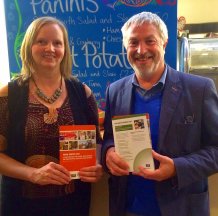
Dr Rebecca Sandover and Food Exeter convenor Martyn Goss
Food Exeter strategy promotes healthy, sustainable city
The strategy, produced by Food Exeter, aims to promote healthy eating, reduce food poverty, promote a strong local food economy and develop a “diverse and vibrant food culture”.
Its focus includes the Sugar Smart Exeter education campaign, a network of breakfast and holiday food clubs for children at risk of food poverty in Exeter and work towards increasing diverse local food outlets in the city, such as pop-ups and a renewed farmers’ market.
The strategy, developed with help from University of Exeter researchers, is being launched this week to a mixed audience including Exeter City Councillors.
Dr Rebecca Sandover worked with Food Exeter’s steering group on the strategy and wrote a report on Food Exeter’s progress, which is also published today.
“Food Exeter is a dynamic, growing network made up of committed organisations and individuals with vision for food change in Exeter” she said.
“There is a strong will amongst members to collaborate and to learn from best practices elsewhere.
“Food Exeter has strong internal and community links, but it needs stronger working relations with local government in order to bring about city-wide food change. Simple actions by local authorities could boost food culture in the city.”
Working with University of Exeter colleague Professor Stewart Barr, Dr Sandover ran a workshop to enable the wider network to feedback on the strategy.
The workshop was held at the organic livestock farm and education centre, West Town Farm, and members of organicARTS helped run it.
Participants from the workshop came up with many ideas for diverse future food projects, including a community café, smoothie bar and an alternative food festival run by Food Exeter.
The report says there are challenges in tackling issues such as affordable healthy eating and promoting local, quality produce. But it says action proposed in the strategy can address both areas.
The research and printing of the documents was funded by an Impact Acceleration Award from the Economic and Social Research Council.
Date: 4 October 2017
